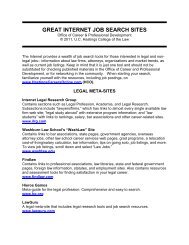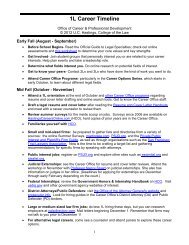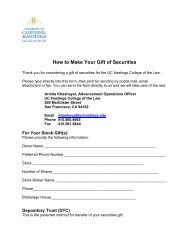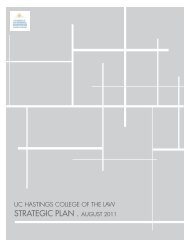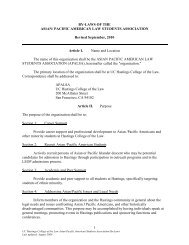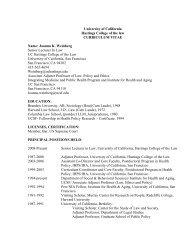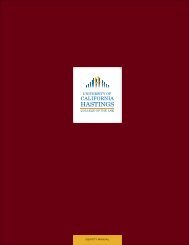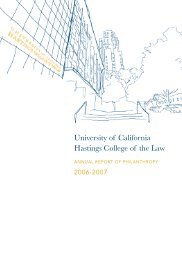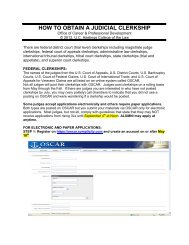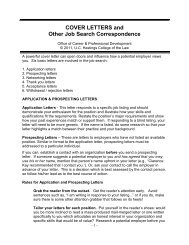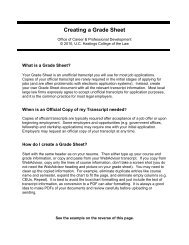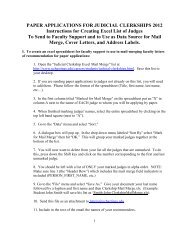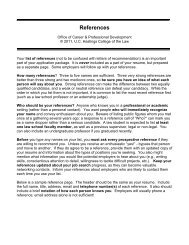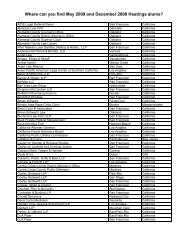CIVIL PROCEDURE I Spring 2012 R. Marcus Assignment Sheet No ...
CIVIL PROCEDURE I Spring 2012 R. Marcus Assignment Sheet No ...
CIVIL PROCEDURE I Spring 2012 R. Marcus Assignment Sheet No ...
Create successful ePaper yourself
Turn your PDF publications into a flip-book with our unique Google optimized e-Paper software.
<strong>CIVIL</strong> <strong>PROCEDURE</strong> I<br />
<strong>Spring</strong> <strong>2012</strong><br />
R. <strong>Marcus</strong><br />
<strong>Assignment</strong> <strong>Sheet</strong> <strong>No</strong>. 1<br />
This assignment sheet introduces how I will approach this<br />
course and indicates the assignments for the first few weeks of<br />
class. These daily assignments are listed at the end of this<br />
long initial memo on how the class will be conducted. By the<br />
time we complete the material indicated on this assignment sheet,<br />
I will hand out another. It will not be nearly as long as this<br />
one.<br />
A general word about assignments: I will usually try to<br />
predict in writing what we will be covering in each class session<br />
over a three- or four-week period. It is important to understand<br />
that the pace of coverage is somewhat difficult to predict,<br />
particularly early in the semester. If we get ahead or fall<br />
behind my predictions, we will proceed in the sequence indicated<br />
below. This means that it is not wise to skip material we have<br />
not finished covering in class in order to read "today's<br />
assignment" unless I have clearly told you that you should skip<br />
material. Unless otherwise announced by me, we will not skip<br />
assigned material even though we have not covered everything<br />
indicated for a given day. You will need to gauge our actual<br />
rate of progress as we move through the material. I expect<br />
students to be prepared for class; if for some reason you are not<br />
able to be prepared for a given class, please tell me so before<br />
that class.<br />
The page references below are to <strong>Marcus</strong>, Redish, Sherman &<br />
Pfander, Civil Procedure: A Modern Approach (5th ed. 2009). The<br />
new edition includes significant changes from the fourth edition,<br />
particularly in Chp. III. As a consequence, getting ahold of a<br />
copy of the fourth edition is not likely to work. (I say this<br />
because in the past people have asked whether prior editions<br />
would be substitutes for the current one.)<br />
In certain assignments, I have also indicated that you<br />
should read specified Federal Rules of Civil Procedure (FRCP) or<br />
sections of the California Code of Civil Procedure (CCP) along<br />
with the casebook assignments. These items are contained in the<br />
current edition of Kane & Levine, Civil Procedure in California,<br />
which is also assigned for this course. The Advisory Committee<br />
<strong>No</strong>tes to certain of the FRCP are included in the pamphlet. These<br />
are explanatory statements about the rules prepared by the<br />
committee that drafts amendments to the rules. They serve as a<br />
sort of legislative history for the rules. On occasion I will<br />
ask you to read these as well.<br />
On occasion I refer as well to parts of The Buffalo Creek<br />
Disaster. I have asked you to read this book for the first class
<strong>CIVIL</strong> <strong>PROCEDURE</strong>, MARCUS 2<br />
SPRING <strong>2012</strong><br />
as a background introduction to litigation. Parts of the book<br />
seem to me to be particularly pertinent to certain portions of<br />
the course, and I have noted these to remind you of parts of the<br />
book that relate to what we are discussing in class. In 2008,<br />
the publisher came out with a new edition, including a Foreword<br />
from Bill Clinton. The Hastings bookstore has both versions for<br />
sale, and I will try to indicate where in each edition you will<br />
find that material I ask you to review for given assignments.<br />
The first page numbers (not underlined) should be references to<br />
the 1976 edition, and the second set (underlined) to the 2008<br />
edition.<br />
Absences from class and make-up sessions: Unfortunately, I<br />
sometimes have to attend meetings or out-of-town events that<br />
prevent me from being here for class at the usual time.<br />
Presently, the first such occasion I know about is on March 22-<br />
23, although I also have another on Jan. 27 (a Friday). I am<br />
uncertain whether I can get to those meetings without leaving<br />
early enough the day before to require me to miss our class. I<br />
intend to make up those classes, and will notify you about when<br />
those makeups will occur as that date draws near. It may happen<br />
that other things come up that require my attendance out of town,<br />
but I hope not.<br />
Recap sessions: When we finish a block of material, I plan<br />
to schedule a "recap" hour outside regular class time.<br />
Attendance is entirely voluntary at these events, which are<br />
designed to provide insights for those who want them about the<br />
block of material we have covered. There is no additional<br />
reading for these sessions. Since I don't know for sure when we<br />
will actually finish given blocks of material, I have not tried<br />
to pick times for these sessions. The assignment sheet therefore<br />
lists them as what might be called "floaters," with general<br />
predications on about when they will occur. I will try to<br />
provide notice when they do occur, and may try to have them<br />
recorded if some who want to attend are unable to do so.<br />
Assigned court visit: Along with your other assignments, I<br />
am requiring each student to make one visit to an actual court<br />
proceeding during the semester. This assignment will not be<br />
graded in the sense that I will assign letter grades to it, but<br />
failure to comply with this requirement will result in lowering<br />
your grade. To give you plenty of lead time, I have set the due<br />
date for this assignment as Thursday, Feb. 16, <strong>2012</strong>.<br />
Each of you is to select, visit, and report about one law<br />
and motion session regarding civil cases in a court of general<br />
jurisdiction. Courts of general jurisdiction (as distinguished<br />
from specialized ones like probate court, juvenile court, etc.)<br />
include the Superior Court of each California county and the U.S.<br />
District Court for the <strong>No</strong>rthern District of California. Law and<br />
motion hearings in federal court may include pretrial motions in
<strong>CIVIL</strong> <strong>PROCEDURE</strong>, MARCUS 3<br />
SPRING <strong>2012</strong><br />
criminal cases as well as civil cases, but make sure your session<br />
includes some civil cases. You don't have to go far from<br />
Hastings to find a lot of courts. Most or all the civil<br />
departments of the S.F. Superior Court are located at 400<br />
McAllister, a little more than a block away. Most of the judges<br />
on the U.S. District Court hold court at 450 Golden Gate Ave., a<br />
block from Hastings. There are Superior Courts in all adjoining<br />
counties, such as Alameda, Contra Costa, Marin, San Mateo and<br />
Santa Clara. There are also U.S. district courthouses in Oakland<br />
and San Jose, but there are fewer judges in them than at 450<br />
Golden Gate Ave.<br />
This court visit will often take a couple of hours. Try to<br />
make sure that you have enough time to stay to the end of the<br />
session. I have asked you to attend a Law & Motion session<br />
(which would, in S.F. Superior, include Writs & Receivers). My<br />
reason is that most of the things we will cover in this course<br />
are likely to be raised by pretrial motion. It would probably be<br />
helpful to defer your court visit until we have covered a fair<br />
amount of material, and the due date should make that possible.<br />
Part of your task is to identify the session you want to<br />
attend and find the courthouse. (This is something lawyers have<br />
to do also.) Good sources for that are the two legal newspapers<br />
for S.F., the Recorder and the Daily Journal. These should be<br />
available in the Library. Both list the calendars of the various<br />
courts so that you can see in advance when there are law and<br />
motion hearings and, to some extent, what they are about. S.F.<br />
Superior Court, for example, usually has two sets of law and<br />
motion sessions at 9:30 and 10:40 each weekday, as well as a<br />
Writs and Receivers session each day. The U.S. District Court<br />
maintains a website -- www.cand.uscourts.gov -- through which you<br />
can view each judge's individual calendar, including law and<br />
motion sessions. For different judges, those sessions occur at<br />
different times, which may be helpful in scheduling to avoid<br />
conflicts with other classes, etc. I note that the S.F. Recorder<br />
and S.F. Daily Journal have online editions, but to access those<br />
you need some sort of password given to those who subscribe.<br />
Hard-copy versions of the papers are in the Library. Another<br />
source is Courttime, which is available through the Hastings<br />
website and features calendar information on local courts.<br />
You may, if you wish, go in a group including classmates,<br />
subject to the request that you not make such a large group as to<br />
startle the judge or interfere with the operation of the court.<br />
After your court visit, you are each to prepare and turn in<br />
to me a memorandum concerning your visit. That memorandum is<br />
what is due on Feb. 16. It should be brief (two or three pages)<br />
and describe what you observed and what you learned from the<br />
visit about the way courts function and the quality of lawyering.<br />
I am looking for a relatively straightforward factual piece (not
<strong>CIVIL</strong> <strong>PROCEDURE</strong>, MARCUS 4<br />
SPRING <strong>2012</strong><br />
a "mood" essay) that identifies the court and proceedings you<br />
observed, describes what happened, and explains any insights you<br />
obtained from the trip to court. This should be more than a rote<br />
recitation of the names of the cases and the issues raised<br />
although these are worthwhile topics), and include also some<br />
reflection on how the lawyers and the judge handled the hearings.<br />
The one or two page directive is not a straightjacket, but<br />
suggests the dimension of the memo that I expect. I want you to<br />
hand in hard-copy versions of your memos because otherwise I<br />
would probably encounter problems printing many of them off, and<br />
also find it difficult to keep track of them all. Be sure to<br />
keep a copy of your memo when you turn it in.<br />
Class attendance: Lest there be any uncertainty about it,<br />
attendance in this class is not optional. The American Bar<br />
Association insists that law schools certify that students attend<br />
class, and we cannot do so if we pay no attention to attendance.<br />
This does not mean that nobody can ever miss a single class, or<br />
that I will be taking attendance. I will, however, be on the<br />
lookout to see if there are instances of regular or prolonged<br />
absence and will attempt to respond to any I notice. If for some<br />
reason it appears that you will be missing a significant number<br />
of classes, please see me at your earliest opportunity.<br />
Laptops: Laptops can provide valuable assistance to law<br />
students in law school, but they also possess the capacity to<br />
divert students from what they should be doing. Obviously, using<br />
them in class to cruise the Web or exchange e-mail is likely to<br />
be a distracting waste of time from the perspective of learning<br />
the material covered in class. We hope that, as adults, law<br />
students realize that such diversions are counterproductive.<br />
Particularly when students are paying considerable sums of money<br />
to attend school, it seems odd that they would use this device to<br />
be mentally absent. Maybe the reason there are no windows in<br />
most law school classrooms is to keep students from staring out<br />
the window rather than paying attention to what's going on in<br />
class. But now that Windows tm is available, there's a much<br />
greater opportunity to stare into space. Students are going to<br />
need to learn to overcome this temptation to waste time<br />
throughout their daily lives to become effective in their<br />
profession. Learning to resist the temptation during class is<br />
even more important.<br />
Laptops also pose a different temptation -- mindless<br />
"stenographic" transcription. Until laptops came along, very few<br />
students could have tried to write down everything that was said<br />
in class. With these devices, it's probably true that many can<br />
do so. The problem is that doing so is not worth it and probably<br />
deprives the student of an important feature of the learning<br />
experience. It's not worth doing because an unedited transcript<br />
of a class is not particularly useful. It detracts from the<br />
classroom learning experience because it defers or avoids the
<strong>CIVIL</strong> <strong>PROCEDURE</strong>, MARCUS 5<br />
SPRING <strong>2012</strong><br />
task of distilling the information being covered. Ultimately<br />
(perhaps under the heading "outlining"), this process of<br />
distillation is the core learning experience for law students.<br />
It starts in the classroom when they evaluate what they hear and<br />
decide what to write down. To write down everything, therefore,<br />
can mean that you are failing to begin this crucial part of the<br />
learning process.<br />
Finally, keep in mind that laptop use may actually be<br />
disturbing to other students who are trying to concentrate on<br />
what's going on in class. On that, consider the report of a<br />
federal judge who sat on a jury in state court and wrote about<br />
the experience:<br />
One behavior was unanimously disliked at one point or<br />
another during the trial: Every juror mentioned being<br />
distracted and annoyed by the noise of lawyers typing notes<br />
into their laptop computers. Interestingly, no comments<br />
were made during the many weeks of trial about the lawyers<br />
who took notes the old-fashioned way, with a pen or pencil<br />
and yellow legal pads. One juror was very outspoken about a<br />
lawyer's "clanking away" on his laptop while she was trying<br />
to listen to important testimony.<br />
Boyle, A Judge on the Jury, 32 Litigation <strong>No</strong>. 4 at 3, 6 (Summer<br />
2006). Web surfing can probably be a bigger distraction than<br />
that. So be considerate of others in the class.<br />
Office hours: My office is Room 316 in the 200 McAllister<br />
building. I am generally there, and usually happy to talk to<br />
students when I am there unless it is the hour just before I have<br />
a class. I also post "official" office hours, but that does not<br />
mean that you can only come around at those times. If I am not<br />
in my office when you try to find me, you can leave me a note<br />
attached to my door or contact me by phone (565-4829) or by email<br />
(marcusr@uchastings.edu).<br />
Examination format: There will be an examination in this<br />
course at the end of the semester at a time set by the<br />
Administration. It will be in essay style, generally in the<br />
format I have used in the past. Some of my old examinations (and<br />
my memos to the students about the exams) should be on file in<br />
the Library. The examination will be closed book. This means<br />
that you may not bring with you or consult the book or any notes<br />
you have made. Although you may not see it this way, I have this<br />
rule partly for your benefit because time you spend searching<br />
through materials you bring to the exam. is time taken from<br />
analyzing and composing answers to the questions on the exam.<br />
The only exception to this rule is that you should bring with<br />
you, and may consult, the Kane & Levine pamphlet. Based on past<br />
experience, I am announcing the following rules for notations in<br />
the pamphlet: Students may write anything they please in the
<strong>CIVIL</strong> <strong>PROCEDURE</strong>, MARCUS 6<br />
SPRING <strong>2012</strong><br />
rules pamphlet, but it is not permissible to use "white-out" to<br />
"create" more space for notes in the Kane & Levine pamphlet. You<br />
may not attach any additional papers to the pamphlet. This<br />
prohibition on attachments includes tabs or pasted-in outlines<br />
produced on your computer. If anyone is at all uncertain about<br />
what any of these rules means, please ask me for a clarification.<br />
Grammar and related issues: In many of what we used to call<br />
grammar schools, it has been out of fashion to teach grammar in<br />
recent years, and many of you may not have been asked to adhere<br />
to the rules of grammar in prior schooling. As lawyers, you will<br />
be measured by the persuasiveness of your written work. If it<br />
has grammatical errors (even very common ones), they will weaken<br />
it. In this class, there is no direct relationship between<br />
grammatical errors and grades, but I thought it worthwhile to<br />
mention common errors that grate on my nerves. My nerves may not<br />
matter, but judges' (and clients') nerves do and many of them<br />
went to school before the new relaxed attitude toward grammar<br />
came into fashion.<br />
Just to prove that I'm not the only fuddy-duddy who cares<br />
about such things, I offer a few examples of judges who do. In<br />
Lohrenz v. Donnelly, 187 F.R.D. 1 (D.D.C. 1999), the judge began<br />
discussing defendants' motion for the imposition of sanctions on<br />
plaintiff's attorney as follows: "The bulk of plaintiff's<br />
misconduct is due purely to sloppiness. First, plaintiff's<br />
counsel averages approximately four typographical, grammatical,<br />
or stylistic errors per page." Id. at 10. Despite these<br />
failings, the judge eventually declined to impose sanctions. On<br />
the other hand, a federal judge in Philadelphia cut an attorney's<br />
hourly billing rate in half in ruling on a fee request due in<br />
part to the mistakes the lawyer made in filings with the court.<br />
See Liptak, Judge Finds a Typo-Prone Lawyer Guilty of Bad<br />
Writing, N.Y. Times, March 14, 2004, at A14. Another judge wrote<br />
about similar problems in a magazine for lawyers:<br />
We see some truly great written advocacy in our court.<br />
We also see some of the most astonishingly incompetent<br />
writing imaginable. You might think that sloppy grammar or<br />
other abuses of the English language do not count and that<br />
glaring deficiencies in writing ought to be ignored. The<br />
problem is that these failures may be outcome-determinative<br />
because they can defeat communication of the message itself.<br />
* * *<br />
I would sum up a view held by most judges on the<br />
subject of poor grammar: The sloppy writer and his or her<br />
cause lose credibility and respect, as well as the reader's<br />
concentration. There is simply no excuse for it.<br />
Gettleman, We Can Do Better, Litigation Magazine (Summer 1999) at
<strong>CIVIL</strong> <strong>PROCEDURE</strong>, MARCUS 7<br />
SPRING <strong>2012</strong><br />
3, 62 (emphasis added).<br />
As professionals, you should start cultivating good<br />
grammatical habits now. I have some pointers based on experience<br />
with law students. Try to avoid the following problems:<br />
1. Singular v. plural: You should be aware whether the<br />
subject of a sentence is singular or plural and make any<br />
predicate references correspond. Thus: "The company is<br />
reviewing its standards for promotion." Many of you might<br />
substitute "their" for its. That would be wrong.<br />
2. Organizational entities: As suggested by the example in<br />
point 1, an organizational entity (company, union, city) is<br />
singular. Don't refer to such an entity as "them." If you<br />
really meant that, you should change the number for the verb.<br />
Thus, do you really feel comfortable with: "The company are<br />
reviewing their standards for promotion." (<strong>No</strong>te that Gerald<br />
Stern makes this mistake several times in the Buffalo Creek<br />
Disaster. The fact that others make this error will not excuse<br />
you.)<br />
3. Misuse of words: Some words used in ordinary language<br />
have special meanings in legalese; these are often called terms<br />
of art. You need to master them. Some are not so obvious. One<br />
that recurs in this course (and is particularly important on your<br />
report of the court visit) is "motion." In this course, it is a<br />
noun meaning a request to the court for an order. See Fed. R.<br />
Civ. P. 7(b). As used in court, it is not a verb; used as a verb<br />
it refers to a physical gesture, like waving. Thus, you can say<br />
"She made a motion to dismiss." You cannot properly say "She<br />
motioned to dismiss." The correct thing to say is "She moved to<br />
dismiss."<br />
There are other words that are often misspelled, or that are<br />
similar in sound but actually different, and you need to attend<br />
to the differences. A common mistake (even in the New York<br />
Times) is to mix up principal and principle. Principal means<br />
"main," and can also be used to describe assets held (v.<br />
interest). Thus: "Our principal objective is to maintain our<br />
principal." Principle means theory or idea. Thus: "The<br />
principle by which we organize our financial affairs is to<br />
maintain our principal." Misusing these words should be<br />
embarrassing, and will be in some instances. Learn the<br />
differences.<br />
Another common mistake is to mix up "effect" and "affect."<br />
Either word can be a verb or a noun, but they have different<br />
meanings. As a verb, effect means to bring about and affect<br />
means to have an effect upon. As a noun, effect means the impact<br />
of something and affect means the outward manifestation of an<br />
inner emotional state. Thus: "To effect change requires work."
<strong>CIVIL</strong> <strong>PROCEDURE</strong>, MARCUS 8<br />
SPRING <strong>2012</strong><br />
"Changes in organization will affect the output." "The changes<br />
had the desired effect." "Because he was taking his medication,<br />
he had an altered affect." Probably you could go through life<br />
without using affect as a noun.<br />
Yet another is an alternative for lawyer -- counsel. This<br />
word can be used as a noun or a verb ("She was counseled by<br />
counsel"), but it is not the same word as council. That word<br />
refers to a body of people such as a city council that is charged<br />
with overseeing some organization. Don't treat counsel and<br />
council as interchangeable.<br />
4. Apostrophes: Some time ago people began using<br />
apostrophes to pluralize. This is flat wrong. Don't do it.<br />
Thus: "Many lawyers speak sloppily." If you wrote "Many<br />
lawyer's speak sloppily" that would have no meaning because<br />
"lawyer's" is possessive (as in "the lawyer's briefcase"). Keep<br />
in mind that there is also such a thing as a plural possessive:<br />
"The lawyers' universal view (as distinguished from the doctors')<br />
was favorable." Accordingly, "Many lawyers' speak sloppily" is<br />
wrong also.<br />
5. Hyphens: As with apostrophes, there has been an<br />
unfortunate proliferation of hyphens. In general, you should put<br />
a hyphen between nouns only if they form an adjectival phrase and<br />
the hyphen would help make your meaning clear. Thus, you might<br />
say "state-court jurisdiction." But you don't normally put a<br />
hyphen between two nouns that are related. Thus: "The case was<br />
in state court" is correct, and to say "state-court" there would<br />
be wrong.<br />
PLEASE REVIEW THESE ADMONITIONS BEFORE YOU WRITE YOUR COURT<br />
VISIT REPORT AND ADHERE TO THEM. I have not decided whether I<br />
will require people who make these errors to submit corrected<br />
memos, but I'm considering that measure. More generally, try to<br />
overcome your temptation to fall into these common mistakes.<br />
Even though they won't hurt your grades here, they will<br />
(sometimes) weaken the credibility of your presentations when you<br />
are a lawyer.<br />
Outside reading: Most students find civil procedure<br />
difficult. Do not assume that you are the only person for whom<br />
this is true. Many believe that useful insights can be found in<br />
outside reading. It is not true, however, that professors try to<br />
make the material difficult and that the easy answers are<br />
contained in other books. For the first few weeks it is probably<br />
pointless to consult outside sources for they may compound rather<br />
than reduce your uncertainty. Some outside materials are cited<br />
in the casebook itself, and going beyond them should probably<br />
await completion of a major block of material (such as the<br />
pleading materials in Chapter III). Nevertheless, for those who<br />
insist on some indication right now about where else they might
<strong>CIVIL</strong> <strong>PROCEDURE</strong>, MARCUS 9<br />
SPRING <strong>2012</strong><br />
look, I offer the following. All of these books should be in the<br />
Library.<br />
One-volume treatises<br />
There are several one-volume treatises on civil procedure<br />
and related areas. The best-known include the following. Please<br />
consult the most recent edition:<br />
Friedenthal, Kane & Miller, Civil Procedure<br />
James, Hazard & Leubsdorf, Civil Procedure<br />
Wright & Kane, Law of Federal Courts<br />
Glannon, Civil Procedure<br />
Teply & Whitten, Civil Procedure<br />
There is also now an anthology of leading articles on a<br />
variety of civil procedure topics that may prove helpful to you:<br />
Levine, Doernberg & Nelken, Civil Procedure Anthology<br />
In addition, there is a book with in-depth examinations of<br />
several of the cases we will read in this course that some might<br />
find informative:<br />
K. Clermont (ed.), Civil Procedure Stories (2d ed. 2008)<br />
Multi-volume treatises<br />
Multi-volume treatises appear more daunting due to their<br />
size, but since they are usually keyed to specific rules and have<br />
a good table of contents, they can be quite accessible. The<br />
leading treatises are:<br />
Federal Practice & Procedure ("Wright & Miller"): This<br />
Treatise is now about 30 volumes long and covers almost the<br />
whole landscape of civil procedure and evidence. On the<br />
spine of each volume is an indication what rules or statutes<br />
are discussed within.<br />
Moore's Federal Practice: This Treatise also indicates on<br />
the spine which topics are covered in the volume. There was<br />
an entirely new edition in 1997.<br />
Commercial outlines<br />
I do not recommend commercial outlines. Some of them I have<br />
looked at contain dramatically wrong statements. Overall they
<strong>CIVIL</strong> <strong>PROCEDURE</strong>, MARCUS 10<br />
SPRING <strong>2012</strong><br />
are not a substitute for anything else, although they may provide<br />
insights late in the semester about how to organize the material<br />
as you prepare for examinations. They are not likely to prove of<br />
much use until you begin reviewing for examinations. At that<br />
time, you might want to examine some of them to see how they put<br />
the pieces together.<br />
NEED TO TAKE <strong>CIVIL</strong> <strong>PROCEDURE</strong> II: Civil Procedure is more<br />
than half the basic civil procedure course, but leaves out a lot<br />
that matters a lot, as suggested at pp. 25-26 of Chp. I. We will<br />
do a brief "introduction" to issues of jurisdiction, but it is<br />
only a sketch. We have another course -- Civil Procedure II -that<br />
can be taken after the first year and covers jurisdiction<br />
and related topics in suitable detail. Taking Civil Procedure II<br />
is critical to getting a full introduction to this subject. For<br />
what it matters in addition, Civil Procedure II deals with many<br />
subjects that frequently come up on the bar examination. You<br />
should make a point of taking it unless you don't want to be a<br />
lawyer and are attending law school purely for its entertainment<br />
value.<br />
Goals of this course<br />
It seems useful to set out goals for the course at the<br />
outset. The assignments below and the class discussion are<br />
designed to address these goals. As in other classes,<br />
consideration of the topics in Civil Procedure often involves<br />
integrating casebook coverage, rules or statutes from the Kane &<br />
Levine supplement, concepts about the "substantive" law that you<br />
may have encountered in other courses (such as Torts or<br />
Contracts), and tactical considerations like those discussed by<br />
the author of The Buffalo Creek Disaster. For lawyers, these<br />
multiple tasks often come combined in one overall challenge.<br />
Overall, the following summarizes what I hope you take away<br />
from this course:<br />
(1) Developing doctrinal understanding: The readings and<br />
in-class discussion will emphasize the topics covered in the<br />
course. Most of these topics depend on the provisions of a<br />
specific constitutional provision, statute, or rule. Topics will<br />
include:<br />
Pleading -- the method of putting a case "at issue" so<br />
that the court can address the parties' contentions<br />
Discovery -- the judicially assisted effort to gather<br />
evidence for use in deciding the case<br />
Adjudication -- the centrality of the right to jury<br />
trial, and the means by which cases can be decided by
<strong>CIVIL</strong> <strong>PROCEDURE</strong>, MARCUS 11<br />
SPRING <strong>2012</strong><br />
the judge<br />
Appeal -- the need to wait until the entire case is<br />
over (the "final judgment") before appellate review<br />
Preclusion -- the binding effect of a final judgment,<br />
preventing the presentation of claims in later cases on<br />
the ground that they are controlled by an earlier<br />
decision<br />
Jurisdiction -- an introduction to the rules governing<br />
whether a court can compel a defendant to appear before<br />
it (personal jurisdiction) and whether a case can be<br />
handled by a federal court (subject matter<br />
jurisdiction)<br />
(2) Gaining an appreciation of professional obligations:<br />
Lawyers must master the doctrinal subjects enumerated in (1)<br />
above, but that is only a baseline for their activities. They<br />
must also appreciate that they owe obligations to their clients<br />
and to the judicial system that affect the extent to which they<br />
"push to the limit" under these rules. In-class discussion will<br />
sometimes involve consideration of whether it is ethical to<br />
pursue certain courses in litigation.<br />
(3) Focusing on strategic judgments: A related and<br />
important focus of lawyers' activities is to make strategic<br />
judgments about the consequences of possible actions in<br />
litigation. In-class discussion will often raise questions about<br />
those judgments. "Thinking ahead" is an important quality of an<br />
effective lawyer. Therefore, we will reflect on why the lawyers<br />
in the cases we study did what they did, and whether another<br />
course of action might have been more effective.<br />
(4) Building skills in making legal arguments: Lawyers<br />
must try to employ the facts available to them to support their<br />
position under the pertinent rules. The casebook and in-class<br />
discussion will often emphasize ways in which the facts might be<br />
marshalled to support one argument or another. Hypotheticals may<br />
sharpen this analysis.<br />
(5) Reflecting on systemic policy choices: Besides honing<br />
your skills as a lawyer, this course introduces you to a variety<br />
of key policy questions that will remain important throughout<br />
your professional career. Another goal is to prompt reflection<br />
on these policy choices, such as:<br />
Pleading: Should the showing necessary to get a case<br />
"into court" be made more demanding, or should all who<br />
want to pursue claims be permitted to do so without<br />
much challenge at the outset?
<strong>CIVIL</strong> <strong>PROCEDURE</strong>, MARCUS 12<br />
SPRING <strong>2012</strong><br />
Discovery: Should parties be required to undertake<br />
disruptive and expensive efforts to provide evidence<br />
for their opponents, or should those who want<br />
information often have to compensate others for taking<br />
the effort to provide it?<br />
Adjudication: Should judges defer to jury decisions in<br />
all cases except those in which one side's position is<br />
almost crazy, or should they take a more active role in<br />
scrutinizing the sufficiency of the parties' evidence?<br />
This inquiry can be viewed as involving the jury as a<br />
fundamental foundation of our democracy.<br />
Preclusion: Should courts resist "second tries" by<br />
litigants who already had one "day in court," or should<br />
they be receptive to new evidence or different grounds<br />
for relief?<br />
Jurisdiction: Should courts make it easy for<br />
plaintiffs to sue distant defendants, or protect<br />
defendants from having to defend cases far from home?<br />
Daily assignments:<br />
Jan. 9 The Buffalo Creek Disaster and this assignment sheet.<br />
If it is of interest to you, the State of West<br />
Virginia maintains a website on the disaster:<br />
www.wvculture.org/history/buffcreek/bctitle.html<br />
Jan. 10 pp. 1-19. Try to focus on the sequence of events in<br />
the case and the bottom line rulings made by the<br />
appellate court (e.g., who really won the case),<br />
so that we can walk through them at the beginning<br />
of class. We will also consider why the court<br />
deems what the judge did inappropriate.<br />
Jan. 11 pp. 19-26; FRCP 16 and Advisory Committee <strong>No</strong>tes on Rule<br />
16 (starting on p. 38 of Kane & Levine); Buffalo<br />
Creek pp. 94-97 (86-88); 213-17(192-96); 240-43<br />
(216-18); 275-99 (247-70)<br />
Jan. 12 Introduction to pleading the claim: pp. 114-32; FRCP 7,<br />
8(a), (d), and (e), 10 and 12(b), (c), (d), (e),<br />
and (f); Form 11 (p. 177 in Kane & Levine -- this<br />
was formerly Form 9); CCP §§ 430.10-430.80,<br />
431.10, and 436; Buffalo Creek pp. 104-05 (94):<br />
The focus here will be on the two cases in the<br />
assigned reading and how pleading rules should be<br />
applied to determine which cases are allowed to<br />
proceed, and on which terms. In the background is
<strong>CIVIL</strong> <strong>PROCEDURE</strong>, MARCUS 13<br />
SPRING <strong>2012</strong><br />
Jan. 16 MLK Holiday<br />
the question what consequences flow for allowing<br />
the case to proceed -- principally the cost and<br />
intrusiveness of discovery for the defendant. As<br />
you may deduce from the listing of rules to be<br />
examined, this is also a point when we begin to<br />
have lots of them to learn. Whether or not you<br />
like it, from here on in there will be rules for<br />
you to learn, and eventually to master.<br />
Jan. 17 Consistency and honesty in pleading: pp. 133-51; FRCP<br />
11; CCP §§ 128.5; 128.7; Buffalo Creek pp. 56-63<br />
(51-58): This session examines the general<br />
receptivity to "inconsistent" pleading, and the<br />
extent to which honesty and/or the rules preclude<br />
such inconsistency. We will focus in particular<br />
on the specifics of Rule 11.<br />
Jan. 18 Applying the rules: pp. 151-58<br />
Jan. 19 More particularized pleading requirements: pp. 158-74;<br />
FRCP 9(b): This will introduce the question of<br />
more particularized pleading requirements than<br />
those applicable to all cases. We will consider<br />
both whether there are reasons for applying such<br />
rules in certain cases, and why those cases should<br />
be subject to special requirements. In addition,<br />
we will consider the importance of private<br />
enforcement of rules like the securities fraud<br />
provisions involved here.<br />
Jan. 23 pp. 174-98: Iqbal Handout. We will consider the way in<br />
which the "new" Bell Atlantic v. Twombly pleading<br />
standards should be applied, including the<br />
approach in Iqbal. The question how to apply these<br />
"new" standards is a topic on which the lower<br />
courts are still debating. Many academics think<br />
that action should be taken to change the rules so<br />
as to alter what the Supreme Court did.<br />
Jan. 24 Defendant's response -- pre-answer motions, default,<br />
and contents of answer -- and plaintiff's<br />
voluntary dismissal: pp. 198-215; 220-22; FRCP<br />
8(b) and (c); 12(a), (g), and (h); 41(a); 55; CCP<br />
431.20; 431.30.<br />
Jan. 25 Amendments to pleadings: pp. 222-27; Krupski v. Costa<br />
Crociere Handout; FRCP 15; 16(b)(3)(A); 16(e); CCP<br />
§ 474; Buffalo Creek, chp. 21 ("The Statute of
<strong>CIVIL</strong> <strong>PROCEDURE</strong>, MARCUS 14<br />
SPRING <strong>2012</strong><br />
Limitations")<br />
Recap Chp. III Recap.: I intend to schedule a Chp. III<br />
recap outside regular class time but around this<br />
point in the semester. As with all recaps, it<br />
will involve no new reading or material and<br />
attendance will be entirely voluntary.<br />
Jan. 26 Discovery overview: pp. 343-68; skim (this does not<br />
mean skip) FRCP 26, 30, 33, 34, and 35; Buffalo<br />
Creek pp. 138-86 (124-67): I intend to introduce<br />
this material in lecture format, and will invite<br />
any questions anyone has about the assigned<br />
reading or about what I say in class.<br />
Jan. 30 Managing the scope of discovery: pp. 368-76; FRCP<br />
26(b)(1); F.R.Evid. 401 (p. 372 n.2)<br />
Jan. 31 pp. 377-87; FRCP 26(b)(2); 33(d)<br />
Feb. 1 Complete Section C of Chp. V. This entry represents a<br />
guess that we will by this point actually be using<br />
this time to complete what was already assigned;<br />
if that's not necessary we can use some of this<br />
hour to move on into work product, the next topic.<br />
Feb. 2 Work Product, pp. 387-99; FRCP 26(b)(3)<br />
Feb. 6 Experts and Investigation, pp. 409-22; FRCP 26(a)(2),<br />
and 26(b)(4)[as amended in Appendix to this<br />
assignment sheet]; Buffalo Creek pp. 230-31 (207),<br />
237-39 (213-15), chp. XXVIII<br />
Feb. 7 Enforcement of discovery obligations: pp. 422-29; FRCP<br />
26(a)(1)(A)(iii); 26(e); 37.<br />
Recap Chp. V Recap.: I intend to schedule a Chp. V<br />
recap outside regular class time but around this<br />
point in the semester. It will occur after we<br />
complete the discovery material.<br />
[An assignment sheet for further coverage will be<br />
handed out by the time we finish this material.]



